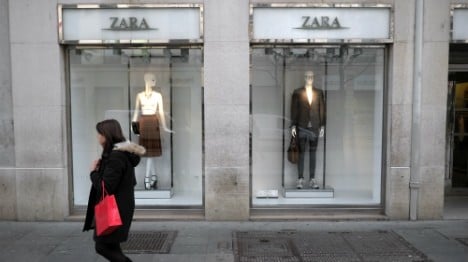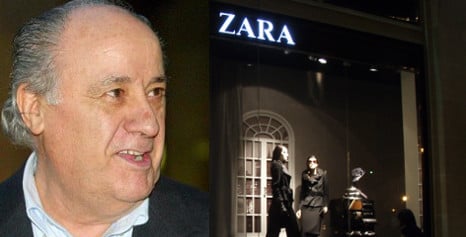The world's largest fashion retailer by turnover, owned by the publicity-shy Amancio Ortega who has become the world's second richest man, said higher clothes sales and a rise in new stores around the globe drove the eight-percent jump.
Profits rose to €1.3 billion ($1.4 billion) in the six months from February 1st while sales were up 11 percent at €10.5 billion, said the company which operates eight store brands including Zara, upmarket label
Massimo Dutti and teen chain Bershka.
Chief executive Pablo Isla said the main reason behind the sales jump was “the execution of our business model globally,” with the opening of more than 80 stores in the first half, including in the new markets of Aruba, Paraguay and Nicaragua.
While its competitors prioritise low production costs and outsource manufacturing to China, Inditex makes more than half of its clothes in factories in Spain, Portugal, North Africa, Turkey and Eastern Europe — relatively close to its main markets.
This business model allows it to get clothes to stores much faster than its rivals and avoid excess inventory.
Clothes made for Zara, for instance, can go from the design stage to store racks in a mere two weeks.
By comparison the process takes Inditex's nearest rival H&M six months because it sources its collection further away in China.
Concern over growth prospects
While H&M regularly challenges it for the global number one spot, Inditex is currently the largest fashion retailer by sales, based on the two companies' first-half results this year.
But Noel Byrne, a business strategy professor at the Madrid branch of Boston's Suffolk University, warned that the Spanish group was bound to face tighter competition in the coming years as rival retailers adjust their own processes to match its quick delivery times.
“When you are making big profits it is one of the most dangerous times in business because the competition want a share of that, and they smell it and they inevitably come,” he told AFP.
As Inditex continues its push outside of Europe and plans to ramp up activities in China, it will also need to adapt its business model for Asia by opening design and production centres in the continent, Byrne added.
International expansion is crucial for the growth of the group, faced with Europe's slow economic recovery.
According to a study by the Barcelona-based EAE Business School, China, Russia and South Korea are the countries where clothes spending has increased the most since 2004.
Spain, meanwhile, only represents two percent of global clothes spending, and its share in Inditex's turnover has gone from 45 to less than 20 percent in just a decade.
Despite the good results, shares in the group fell 0.89 percent to €32.39 in mid-afternoon trading due to a mix of profit taking and concern over “growth prospects in the second half that are slightly lower than before,” said Manuel Pinto, an analyst at brokers XTB.
By Emmanuelle Michel / AFP



 Please whitelist us to continue reading.
Please whitelist us to continue reading.
Member comments